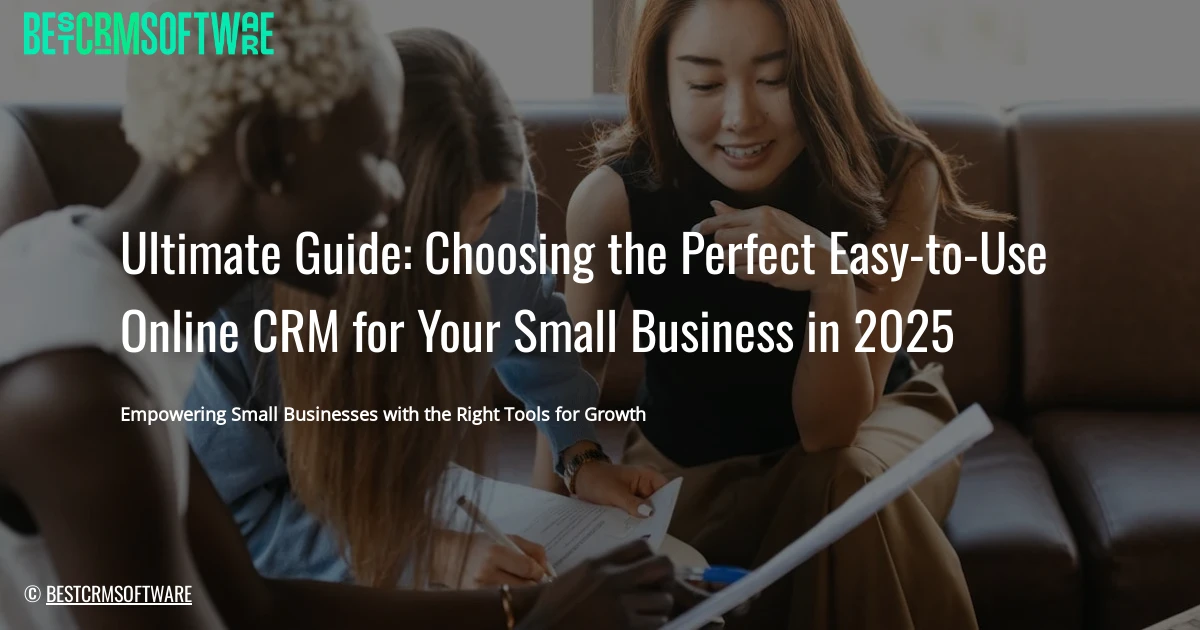Empowering Small Businesses with the Right Tools for Growth
1. Assess Your Business Requirements
Choosing the right CRM for your small business in 2025 begins with a deep understanding of your unique needs and challenges. This first step is crucial to avoid getting overwhelmed by the sheer volume of options available. To streamline your search, focus on these key areas:
1.1. Understanding Your Business Needs
Before jumping into features, ask yourself:
- What are your core business processes? Do you rely heavily on sales, marketing, customer support, or a blend of these?
- What is your primary target audience? This will dictate the type of customer interactions and communication channels your CRM needs to support.
- How many users will need access to the CRM? Consider the number of employees and the potential growth of your team.
- What is your data security and compliance requirement? Your chosen CRM should meet all necessary regulations and offer strong data protection measures.
1.2. Identifying Sales and Marketing Pain Points
- What challenges are you currently facing with sales and marketing? Are you struggling with lead management, nurturing potential clients, or tracking customer interactions effectively?
- Are your sales and marketing teams aligned? Do they have clear communication and access to shared data?
- Do you need automation to streamline repetitive tasks? This could include scheduling email campaigns, creating automated follow-up sequences, or automating lead qualification.
- Are you using multiple tools that aren’t integrating effectively? A CRM can serve as a central hub for data, unifying different systems and creating a more streamlined workflow.
1.3. Determining Budget and Resources
- What is your budget for a CRM solution? There are affordable options available, so be realistic about what your company can afford.
- Do you have the necessary internal resources to implement and manage a CRM? Some solutions require dedicated IT support or integration with existing systems.
- Consider the cost of ongoing subscriptions, training, and support. Factor in these recurring expenses when assessing the overall value proposition.
By thoroughly understanding your business needs, pain points, and financial capabilities, you can significantly narrow down your CRM options and make a more informed decision. This initial assessment sets the foundation for finding a solution that will truly support your business goals and propel your success in 2025.
2. Prioritizing User-Friendliness
A CRM should be an intuitive tool that empowers your team, not a complicated burden. Choosing the right platform comes down to finding one that’s easy to learn, navigate, and use on a daily basis. Here are some key aspects to consider:
a. Cloud-Based vs. On-Premise CRM:
- Cloud-Based: These CRMs are hosted online, meaning you access them through a web browser. This eliminates the need for complex installations, updates, and hardware maintenance. Cloud-based solutions are typically more affordable, accessible from any device, and easily scalable.
- On-Premise: On-premise CRMs require installation and maintenance on your company’s own servers. They offer more control over data security and integration, but come with a higher initial cost, require dedicated IT expertise, and may have limited accessibility.
For small businesses in 2025, cloud-based CRMs are generally the preferred choice due to their affordability, user-friendliness, and flexibility.
b. Ease of Navigation and User Interface:
- Clean, Intuitive Layout: Look for a CRM with a visually appealing and straightforward interface that organizes information logically. Menus, tabs, and icons should be easy to understand and locate.
- Drag-and-Drop Functionality: Drag-and-drop features streamline the organization of tasks, contacts, and information.
- Customization Options: Choose a CRM that allows you to personalize dashboards, fields, and reports to meet your unique business needs.
c. Mobile Accessibility and Responsiveness:
- Mobile-First Approach: Your CRM should function flawlessly on smartphones and tablets. This is crucial for teams working remotely or needing access to client data on-the-go.
- Responsive Design: A responsive design automatically adjusts the layout and size of the interface for seamless viewing and interaction across different devices.
Remember: Ease of use is critical for maximizing adoption within your team. Avoid complex and cumbersome CRMs that will deter your employees from using the platform to its full potential. A user-friendly CRM ensures data consistency, increases team efficiency, and ultimately contributes to a successful business outcome.

© Helena Lopes
3. Essential CRM Features for Your Small Business in 2025
Choosing the right CRM involves considering several essential features. These features streamline your sales processes and help you manage your business effectively. Here are three key aspects to focus on:
1. Contact Management:
- Centralized Database: A robust CRM should offer a centralized repository for all your contact information. This includes contact details, company information, interaction history, and any relevant notes.
- Segmentation and Grouping: Effective contact management enables you to segment your customer base based on various factors like demographics, purchasing history, or engagement levels. This helps you create targeted campaigns and personalize interactions.
- Advanced Search and Filtering: You need a system that lets you easily search and filter contacts based on specific criteria. This allows you to quickly identify and reach out to the right prospects at the right time.
- Email Integration: The ability to directly manage email communications within the CRM platform streamlines communication, keeping all interactions in one place.
2. Lead Tracking and Nurturing:
- Lead Capture and Qualification: Your CRM should seamlessly capture leads from various sources, such as your website, social media, or events. It should also help you qualify leads based on pre-defined criteria.
- Lead Scoring: Assigning scores to leads based on their behavior and engagement allows you to prioritize your efforts and focus on the most promising prospects.
- Automated Nurturing Campaigns: Utilize pre-defined automated sequences to send emails, notifications, or other relevant information to leads at various stages in their journey. This helps move them through the sales funnel efficiently.
- Analytics and Reporting: Gain insights into lead sources, conversion rates, and the effectiveness of your nurturing campaigns. This allows you to continually optimize your lead generation and nurturing strategies.
3. Sales Pipeline Management:
- Visual Pipeline View: A clear and intuitive visual representation of your sales pipeline allows you to track progress at a glance. This provides a holistic view of where your deals stand at any given time.
- Deal Management: The CRM should offer features to manage and track deal stages, progress, and associated tasks.
- Opportunity Tracking: Monitor opportunities effectively by recording interactions, relevant notes, and potential roadblocks. This ensures you remain informed and proactive throughout the sales process.
- Reporting and Forecasting: Gain valuable insights into sales performance, track key metrics, and predict future outcomes. This helps you make informed decisions about your sales strategies and resource allocation.
By carefully evaluating and selecting a CRM that offers these key features, you’ll gain a valuable tool for streamlining your sales processes, boosting productivity, and ultimately growing your small business. Remember to consider the specific needs and priorities of your company while choosing the best solution for you.
4. Exploring Integrations and Add-ons: Expanding Your CRM’s Capabilities
A solid CRM is more than just a contact database. It should seamlessly integrate with other essential business tools you use daily. This is where integrations and add-ons come into play, enabling your CRM to become a central hub for all your business operations.
Here are three critical areas where seamless integrations can amplify your CRM’s functionality:
a) Email Marketing Integration:
- Streamlined Communication: Combine your CRM with an email marketing platform for targeted, personalized email campaigns based on customer data and behaviors.
- Improved Engagement: Track email opens, clicks, and conversions directly within your CRM for better insights into audience engagement and response.
- Automated Workflows: Automate welcome emails, abandoned cart reminders, and follow-up campaigns to nurture leads and drive conversions without manual intervention.
b) Social Media Management:
- Centralized Monitoring: Manage all your social media platforms from within your CRM, monitoring conversations, responding to comments, and analyzing social media engagement.
- Lead Capture and Qualification: Utilize social media ads and landing pages to capture leads and automatically populate their details into your CRM, providing valuable information for nurturing.
- Personalized Social Engagement: Tailor social media messaging and engagement based on customer segments and preferences, creating a more personalized and impactful experience.
c) Customer Support Ticketing:
- Streamline Support Processes: Integrate your CRM with a ticketing system to handle support requests, track their progress, and ensure a seamless experience for customers.
- Efficient Team Collaboration: Provide a unified platform for customer support agents to collaborate, share information, and address issues effectively.
- Automated Response and Routing: Use automation to assign tickets to appropriate team members based on skills, issue type, or customer history, improving response times and customer satisfaction.
By integrating your CRM with tools that align with your specific business needs, you’ll unlock its full potential, optimizing workflows, improving efficiency, and ultimately fostering a better customer experience.
Important Note:
Always evaluate the compatibility of the chosen integrations and their impact on the overall performance and ease of use of your CRM.

© Helena Lopes
5. Evaluating CRM Options: Demystifying the Choice
With a good understanding of your specific needs and must-have features, you’re ready to dive into the vast world of CRMs. Here’s how to dissect each option and pinpoint the perfect fit:
5.1 Free Trial Periods:
Most CRMs offer free trial periods ranging from 14 to 30 days. These are your golden opportunities to:
- Put the CRM through its paces: Import your existing data, explore different features, and test the user interface (UI).
- Realistically simulate daily use: Engage with your team, run reports, and evaluate the overall efficiency.
- Test integrations: Ensure the CRM integrates seamlessly with your existing software.
Don’t be shy about asking for an extended trial if you need more time for a thorough evaluation.
5.2 Demo Versions:
Many CRMs also offer live demos conducted by their specialists. These are a great way to:
- Gain expert insights: Understand the nuances of specific features and get practical advice from seasoned users.
- Ask tailored questions: Get answers directly from the CRM team about any specific concerns or customizations.
- Get a guided tour: See how the CRM operates in a practical, real-world setting.
Don’t hesitate to request a personalized demo focusing on your unique business challenges.
5.3 User Reviews and Testimonials:
One of the most valuable sources of information comes from existing users. Check out reputable online platforms like:
- G2 Crowd: Offers comprehensive reviews based on factors like ease of use, features, customer support, and more.
- Capterra: Similar to G2, with in-depth insights into the strengths and weaknesses of different CRMs.
- Software Advice: Provides detailed user reviews and expert opinions on a wide range of CRM solutions.
Look beyond positive reviews. Pay attention to criticisms, as they can offer a more balanced and insightful perspective.
Remember, the best CRM for your business will be one that perfectly meets your specific needs. Don’t settle for second best, leverage the resources mentioned above to make an informed decision.
6. Ensuring Data Security
Your CRM houses sensitive information about your customers and your business, so protecting it should be paramount. In 2025, data security is no longer just a good practice, it’s an essential requirement for any reputable CRM provider. Here’s what you should look for:
Data Security and Privacy:
- Data Encryption: Make sure the CRM uses end-to-end encryption for data storage and transmission. This ensures that data is scrambled and unreadable to unauthorized individuals.
- Access Control: Look for features like role-based access control, which limits users to only the data and functions they need. This minimizes the risk of accidental or malicious data breaches.
- Regular Security Audits: A reputable CRM provider will regularly audit its security measures to identify and address potential vulnerabilities. Ask about the frequency of these audits.
- GDPR and CCPA Compliance: In 2025, the General Data Protection Regulation (GDPR) and the California Consumer Privacy Act (CCPA) will continue to shape the landscape of data privacy. Ensure your chosen CRM adheres to these regulations and offers tools to help you manage customer data ethically and compliantly.
Compliance with Industry Regulations:
- HIPAA (Healthcare): If you handle sensitive health information, choose a CRM that is HIPAA-compliant and adheres to stringent security standards.
- PCI DSS (Payments): For businesses handling credit card information, look for a CRM that is PCI DSS compliant, demonstrating a commitment to secure processing and storage of financial data.
- Other Industry Standards: If you operate in specific sectors, research any relevant industry-specific security standards that apply to your CRM choice.
Data Backup and Disaster Recovery:
- Regular Backups: Ensure your CRM provider performs regular data backups. This ensures data can be restored in the event of a system failure or data loss.
- Disaster Recovery Plans: A solid disaster recovery plan helps your business recover quickly from disruptions. Look for CRM providers that have well-defined procedures in place for such events.
In a Nutshell: When choosing a CRM, prioritize data security. Look for robust features and a provider that actively implements best practices to safeguard your data and ensure compliance with relevant regulations. A secure CRM empowers you to confidently manage customer information while mitigating risks and ensuring compliance.

© Emmy E
7. Determining CRM Costs
Choosing the right CRM isn’t just about features and functionality; it’s also about budget. Here’s a breakdown of the key costs you’ll need to consider:
7.1 Monthly or Annual Subscription Fees:
- Pricing Tiers: CRMs typically offer tiered pricing based on features, user capacity, and data storage. Small businesses will often start with the basic tier but might need to upgrade as they grow.
- Hidden Fees: Be sure to factor in any additional costs such as for:
- SMS marketing integration
- E-commerce integrations
- Advanced analytics dashboards
- Specialized features specific to your industry
- Promotional Periods: Many CRMs offer promotional rates or free trials for new users, so consider if the pricing changes after this period.
7.2 Implementation and Training Costs:
- Setup & Customization: Depending on the complexity of your needs and the level of customization required, some CRMs may require professional assistance with implementation. This cost can vary significantly based on the CRM and your individual requirements.
- Training: You’ll need to allocate funds for training your team on how to use the new CRM effectively. While some platforms offer user-friendly interfaces, adequate training ensures seamless adoption and optimal usage.
- Integration Costs: Integrating your CRM with existing systems like accounting software, email marketing platforms, or marketing automation tools may require additional setup costs and/or third-party integration tools.
7.3 Potential for Scalability:
- Cost per User: When you expect your business to grow, evaluate how the CRM’s pricing scales per user. If you’re a rapidly growing business, opting for a scalable CRM can save you from cost overruns later.
- Upgrade Costs: Determine if there are additional charges for features you may need to utilize as your business evolves.
Ultimately, it’s about finding a balance: Look for a CRM that provides the essential features at an affordable price, without compromising on its long-term value and scalability. You’ll need a system that adapts to your evolving business needs without breaking the bank.
8. Understanding Implementation: Making the Switch Seamless
Choosing the right CRM is only half the battle. Successfully implementing it and ensuring its effectiveness are crucial for your small business’s success. This section focuses on three critical aspects of implementation: the process itself, data migration, and available support.
8.1 Implementation Process and Timeline:
Every CRM has a unique implementation process. You need to consider factors like:
- Onboarding: How long will it take for the provider to set up your CRM with your chosen features and integrations?
- Customization: How customizable is the platform, and will you need the help of the vendor for initial customization?
- Configuration: How much configuration and setup will you have to handle yourself?
- Data input: Will you need to manually enter your existing data or can it be migrated automatically?
- Training: How will you be trained on the system and how long will that take?
It’s essential to understand the expected timeline for implementation. This includes everything from signing the contract to your CRM going live. Some CRMs have pre-defined timelines while others might offer more flexibility depending on your needs.
8.2 Data Migration and Integration Support:
One of the most important aspects of implementing a new CRM is smoothly transferring data from your old system.
- Data Migration Options: Some vendors offer built-in tools for migrating data. Others require third-party services or manual data entry.
- Data Compatibility: Ensure the chosen CRM supports the data formats used in your existing system and allows for seamless integration with your essential tools, such as your email marketing platform, accounting software, and website.
A clear understanding of the data migration process and its support is crucial to avoid disruptions in your daily operations.
8.3 Training Resources and Documentation:
User adoption is crucial for a CRM’s success. To encourage that, sufficient training and support are essential.
- Onboarding Training: The CRM vendor should offer initial onboarding training for key users.
- Online Resources: Look for a vendor that offers extensive online documentation, tutorials, and videos.
- Dedicated Support: Some CRMs may provide dedicated account managers or support teams to guide you through the implementation process and answer your questions.
Final Note:
By carefully analyzing these aspects of implementation, you can choose a CRM that offers a seamless transition, minimized downtime, and a positive user experience for your entire team. The right CRM is not just about finding the right features, it’s also about understanding the implementation process and ensuring the right resources are in place to make the change a successful one.

© Emmy E
9. Evaluating Vendor Support: A Crucial Factor for Your Success
Even the most user-friendly CRM can hit a snag. That’s why reliable vendor support is a critical element of choosing the right platform for your small business. This means going beyond basic functionality and delving into the support offered throughout your journey:
- Onboarding Assistance: Starting off right is key. Look for vendors who provide:
- Structured onboarding programs: Ensure a smooth transition, helping you learn the CRM efficiently.
- Dedicated support staff: Who can guide you through setup and initial configuration.
- Online resources: Such as tutorials, documentation, and FAQs, making self-learning accessible.
- Technical Support Channels: Having multiple options ensures you can get help when you need it. Check for:
- 24/7 support: Especially essential for businesses operating across time zones or requiring urgent assistance.
- Multiple contact options: Phone, email, chat, and knowledge bases provide a variety of support avenues.
- Responsive ticket system: With clear updates and efficient issue resolution.
- Customer Service Responsiveness: Beyond just technical assistance, focus on:
- Proactive engagement: Regular communication, product updates, and community forum interaction demonstrate commitment.
- Prompt issue resolution: Your issues should be addressed quickly and effectively, minimizing disruption.
- Friendly and knowledgeable support staff: Who can understand your needs and provide clear, actionable advice.
The importance of excellent vendor support can’t be overstated. It safeguards your investment, ensures efficient operation, and allows you to focus on what truly matters – building your business.
10. Top CRM Recommendations
Choosing the right CRM for your small business can feel overwhelming. To help you navigate this landscape, here are three top-rated CRMs known for their user-friendliness and suitability for smaller organizations:
1. HubSpot CRM:
HubSpot is a powerful CRM with a free plan, making it accessible to startups and smaller businesses. It boasts an intuitive interface, a focus on ease of use, and an extensive range of features that integrate seamlessly with its other marketing and sales tools. Key strengths include its:
- Easy-to-use drag-and-drop interface: Ideal for businesses without technical expertise.
- Free plan: Offers basic functionality, enabling you to get started without upfront costs.
- Strong customer support: Their robust support system is readily available through chat, email, and phone.
2. Zoho CRM:
Zoho CRM is another popular choice known for its robust features at an affordable price. Its interface is clean and straightforward, and the platform is highly customizable. Key features that make it stand out include:
- Comprehensive automation tools: Automating tasks and workflows streamlines processes.
- Multiple integrations: Connect seamlessly with popular tools for accounting, marketing, and more.
- Affordable pricing: Flexible pricing plans offer a variety of options to fit your budget.
3. Salesforce Essentials:
While known for its enterprise-level offerings, Salesforce also provides a simplified and affordable solution called Essentials. This CRM caters specifically to smaller businesses, focusing on core functionalities for sales and service. Its notable benefits include:
- Seamless onboarding process: The streamlined interface ensures a smooth learning curve for new users.
- Simplified sales pipeline management: Helps track deals effectively with a visual overview.
- Built-in customer support tools: Provides everything you need to offer exceptional customer service.
Remember, this list is just a starting point. Exploring other CRMs is recommended, as the best fit ultimately depends on your unique needs, budget, and company size. We recommend that you demo multiple CRMs before making a final decision.

© fauxels
11. User-Friendly Alternatives
While the big names in CRM have their merits, navigating their complex features can sometimes feel like climbing Mount Everest. If simplicity is your ultimate priority, these user-friendly alternatives might be the perfect fit for your small business:
Less Annoying CRM: True to its name, this CRM focuses on delivering a clutter-free, straightforward experience. It boasts intuitive navigation, a minimal learning curve, and a pricing structure that caters to small businesses. Less Annoying CRM shines for its simplicity and focus on the core essentials – managing leads, contacts, and communication.
Keap: Formerly known as InfusionSoft, Keap offers a more robust solution with advanced features like email automation and landing page creation. But don’t let the extra bells and whistles scare you off – Keap prides itself on user-friendly design and helpful resources, making it an accessible option even for beginners.
Insightly: A powerful yet approachable platform, Insightly offers comprehensive CRM functionalities for sales, marketing, and project management. It integrates seamlessly with popular apps like Gmail and Outlook, enhancing productivity and efficiency. With a focus on intuitive design and insightful reporting, Insightly provides a well-rounded user experience for small businesses looking for more advanced features.
12. Exploring Niche-Specific CRMs
While general-purpose CRMs can serve a wide range of businesses, some sectors benefit from solutions tailored to their specific needs. For smaller businesses operating in specialized industries, niche CRMs offer valuable features and integrations designed to optimize workflows and address industry-specific challenges.
Let’s look at three niche-specific CRM solutions that cater to different industries:
1. Pipedrive: Designed for sales teams, Pipedrive offers a strong visual pipeline management system, ideal for tracking deals and managing sales processes effectively. Its strengths:
- Sales-Focused: Pipedrive prioritizes deal progression with its intuitive pipeline management system, helping you visualize and manage the entire sales funnel.
- Easy Integration: Pipedrive integrates seamlessly with various business tools like email marketing platforms, calendar apps, and more, simplifying workflow automation.
- Mobile-First: Its intuitive mobile app enables access to essential functionalities from anywhere, perfect for keeping track of leads and activities while on the go.
2. Freshsales: Catering specifically to smaller businesses, Freshsales prioritizes accessibility and affordability without sacrificing key CRM functionalities. Its strengths:
- Simple User Interface: Freshsales boasts a straightforward interface that’s easy to learn and navigate, even for beginners unfamiliar with CRMs.
- Smart Automations: Streamline repetitive tasks with automated email sequences, follow-ups, and more, enabling your sales team to focus on higher-impact activities.
- Phone Integration: Directly manage and track calls within the Freshsales platform, providing a seamless experience for handling communication effectively.
3. Nutshell: Specializing in the marketing and sales needs of small businesses, Nutshell offers comprehensive functionality in a user-friendly interface. Its strengths:
- Simplified Sales & Marketing: Combining robust marketing automation tools with lead management capabilities, Nutshell helps streamline your sales and marketing efforts.
- Effective Reporting & Analytics: Gain actionable insights from comprehensive reports that offer valuable data for optimizing marketing campaigns and sales processes.
- Support & Onboarding: Nutshell provides strong customer support and intuitive onboarding resources to ensure a smooth transition and a positive user experience.
These niche CRMs are just a glimpse into the vast range of industry-specific solutions available. The key is to research and select a platform that best addresses your specific industry requirements, workflows, and overall business objectives.
Remember, a niche-specific CRM can provide the competitive edge your small business needs by delivering specialized features and tailored integrations for your industry.

© fauxels
13. Trends Shaping the Future of CRMs
The world of CRM is constantly evolving, with new technologies and approaches emerging regularly. To ensure your business is staying ahead of the curve, it’s important to be aware of the key trends that are shaping the future of CRMs in 2025 and beyond.
Here are three key trends to watch:
a. Mobile CRM Apps: The lines between our professional and personal lives continue to blur. Today, most small business owners need access to critical information from anywhere, anytime. Mobile CRM apps are a critical component of this shift. These apps are designed for seamless integration with smartphones and tablets, allowing you to manage customer interactions, track leads, and analyze data on-the-go. Expect to see increasingly intuitive interfaces and enhanced features designed specifically for mobile use.
b. AI-Powered CRM Features: Artificial intelligence (AI) is rapidly transforming businesses in every sector. In the CRM world, this means smarter insights, streamlined processes, and more personalized customer experiences. AI-powered CRMs can analyze large amounts of data to identify patterns and trends, predict customer behavior, automate routine tasks, and provide real-time recommendations.
c. Personalized Customer Journeys: Gone are the days of one-size-fits-all marketing campaigns. Customers are increasingly expecting personalized experiences, from the initial point of contact to the ongoing relationship. This trend is being driven by AI and data analysis capabilities, which allow CRMs to tailor interactions and offers based on individual customer preferences and behavior. The ability to create customized customer journeys that provide a seamless and engaging experience will become increasingly essential for small businesses.
14. Benefits of Using an Online CRM
Implementing an online CRM for your small business can unlock a treasure trove of benefits that lead to stronger customer relationships, boosted sales, and ultimately, business growth. Here’s how:
1. Improved Customer Relationship Management:
- Centralized Customer Data: A CRM acts as a single source of truth for all customer information, eliminating silos and ensuring consistent data across all touchpoints. This allows you to understand your customers better, their preferences, past interactions, and purchasing history, providing a more personalized and engaging experience.
- Enhanced Customer Service: By tracking interactions, inquiries, and feedback, CRMs empower you to address issues proactively, resolve problems quickly, and anticipate customer needs. This results in improved satisfaction, higher loyalty, and a positive brand reputation.
- Automated Communication: Personalized emails, SMS reminders, and targeted campaigns become effortless with CRM automation. Stay connected with customers at the right time with relevant content, fostering a strong sense of connection and value.
2. Enhanced Sales Productivity:
- Streamlined Sales Process: CRMs automate and simplify sales tasks like lead management, opportunity tracking, and pipeline forecasting, freeing up valuable time for your sales team to focus on closing deals.
- Targeted Lead Nurturing: By identifying and prioritizing leads with higher conversion potential, you can personalize your outreach, nurture them through the sales funnel, and close more deals.
- Sales Insights and Analytics: Gain actionable insights into sales performance, identify bottlenecks, and track progress against goals with detailed reports and dashboards. This allows for better forecasting, optimized resource allocation, and data-driven strategy.
3. Data-Driven Decision-Making:
- Real-time Reporting and Analytics: Get a holistic view of your customer base, sales performance, marketing efforts, and operational efficiency with real-time dashboards and reports.
- Identify Trends and Patterns: Deep dive into customer behavior, preferences, and purchase history to identify emerging trends, adjust strategies accordingly, and gain a competitive edge.
- Data-Informed Strategies: Back your business decisions with reliable data, allowing for more targeted campaigns, effective resource allocation, and proactive risk management.
By adopting an online CRM, your small business can unlock its true potential, improve efficiency, strengthen customer relationships, and achieve lasting success in the ever-evolving business landscape.

© Alexander Suhorucov
15. Common CRM Implementation Pitfalls
Implementing a new CRM can be a game-changer for your small business, but it’s essential to avoid these common pitfalls that can sabotage your success:
15.1 Overcomplicating with Features:
Many CRM systems boast an abundance of features, but not all of them are necessary for a small business. Overloading your system with too many features can overwhelm your team, lead to confusion, and ultimately, underutilization. Remember, less is more when it comes to ease of use. Choose a CRM with core functionality tailored to your specific needs, focusing on what drives your sales and customer relationships.
15.2 Lack of User Adoption:
Investing in a fancy CRM system only to have your team ignore it is a costly mistake. Avoid this by ensuring the selected CRM is intuitive, user-friendly, and tailored to your team’s workflows. Proper training, onboarding, and continuous communication about the benefits of using the CRM are essential for successful adoption.
15.3 Inadequate Data Hygiene:
Accurate data is the foundation of any effective CRM. Poor data quality leads to incorrect insights, faulty analysis, and ineffective communication. Ensure your data is clean, consistent, and regularly updated. Consider investing in data cleansing tools and setting up protocols to ensure accurate information entry.
Remember: A CRM system is meant to simplify and streamline your processes, not add unnecessary complexity. Choose a platform with the right features, prioritize user-friendliness, and maintain data integrity for a successful implementation that drives growth for your business.
16. Strategies for Successful CRM Implementation
A robust CRM system is a powerful tool, but its success depends on how you implement and use it. Here are three crucial strategies to ensure your CRM delivers real value to your business:
16.1 Establish Clear Goals and Metrics:
Before diving into CRM implementation, define your specific objectives and how you’ll measure success. For instance:
- Goal: Increase sales conversions by 15%
- Metric: Number of leads generated, conversion rates from leads to sales
Defining clear goals and metrics helps you track progress, identify areas for improvement, and ultimately demonstrate the value of your CRM investment.
16.2 Promote User Adoption and Training:
The success of your CRM heavily relies on its active use by your team.
- Provide comprehensive training: Ensure all users understand the features and functionalities of the CRM system.
- Offer ongoing support: Establish a dedicated contact point for answering user questions and resolving issues.
- Encourage regular usage: Incentivize staff with bonuses or gamification elements to adopt the CRM as a key business tool.
16.3 Maintain Data Quality and Integrity:
Inaccurate data renders your CRM useless. Here’s how to keep your CRM data reliable:
- Develop data entry procedures: Establish clear guidelines for accurate data input, avoiding redundancy or missing information.
- Regularly clean and validate data: Use built-in CRM tools or third-party solutions to ensure accuracy and eliminate duplicates.
- Implement data access controls: Limit access to sensitive data based on user roles and responsibilities to prevent unintentional errors or misuse.
By prioritizing these strategies, you’ll transform your CRM from a potentially unused resource into a valuable tool driving efficiency, better customer interactions, and increased business growth.

© Alexander Suhorucov
17. Evaluating CRM Success: From ROI to Optimization
You’ve invested in a CRM, now it’s time to make sure it’s paying off. This section covers the critical aspects of evaluating your CRM’s performance, ensuring your investment is truly driving business growth.
17.1. Measuring ROI on Your CRM Investment:
A CRM should be an investment, not an expense. To gauge its true worth, you need to measure its Return on Investment (ROI). Here’s how:
- Identify your goals: Define your key business objectives before implementing your CRM. These could be increased sales, improved customer satisfaction, enhanced lead conversion rates, or streamlined communication.
- Track key metrics: Quantify the impact of your CRM on your chosen objectives. Monitor metrics like:
- Lead conversion rates: Track how many leads your CRM helps you convert into paying customers.
- Customer retention: Observe how well your CRM supports long-term customer relationships.
- Sales cycle length: Assess whether the CRM has shortened your sales cycle.
- Customer lifetime value (CLTV): Determine if the CRM is increasing your customers’ overall value to your business.
- Sales team efficiency: See if your sales team is spending more time on valuable activities, like relationship-building.
- Analyze and report: Periodically review your data to understand your CRM’s impact and make necessary adjustments. Use tools like CRM reports and dashboards to get insights quickly.
17.2. Tracking Key Performance Indicators (KPIs):
To truly measure the success of your CRM strategy, track specific KPIs that relate to your defined objectives.
- Sales & Marketing:
- Number of qualified leads generated: Track how many potential customers your CRM is identifying.
- Average lead response time: Gauge how efficiently your team engages with leads.
- Conversion rate: Measure how many leads translate into actual sales.
- Marketing campaign ROI: Determine the return on investment for marketing efforts supported by your CRM.
- Customer Service & Retention:
- Average resolution time for customer issues: Monitor how quickly your CRM empowers you to solve customer problems.
- Customer satisfaction scores: Track feedback to measure your CRM’s role in boosting customer satisfaction.
- Repeat customer rate: Analyze the percentage of customers returning for future purchases, indicating the effectiveness of your CRM-powered relationship building.
- Churn rate: Monitor the rate at which customers are discontinuing business, revealing potential issues in customer experience that the CRM could address.
17.3. Adapting and Optimizing Your CRM Strategy:
Continuously evaluating your CRM is crucial. By analyzing data, identifying bottlenecks, and staying informed about evolving technology, you can maximize its impact:
- Identify and address shortcomings: Use the collected data to pinpoint areas where your CRM strategy needs improvement. Perhaps your lead scoring is flawed, your automation needs tweaking, or your team needs additional training.
- Embrace innovation: The CRM landscape is constantly changing. Keep abreast of new features, integrations, and platforms that could benefit your business.
- Iterate and refine: Use your data and learnings to refine your strategy, continuously optimize processes, and ensure that your CRM remains a powerful tool for growth.
By staying data-driven, being proactive about adapting, and never settling for the status quo, you can ensure your chosen CRM delivers optimal results and fuels your small business’s success.
18. Future-Proofing Your CRM Strategy
The world of CRM is constantly evolving, and to truly maximize its impact on your small business, you need a strategy that anticipates future needs. This section dives into three crucial aspects:
1. The Evolving CRM Landscape:
- Shift to cloud-based solutions: Cloud-based CRMs offer scalability, accessibility, and affordability, making them ideal for dynamic small businesses.
- Increased integration capabilities: Expect CRMs to become even more deeply integrated with other business tools like accounting software, marketing automation platforms, and e-commerce solutions.
- AI and automation: Artificial intelligence and machine learning will become increasingly prevalent, offering powerful capabilities for personalized customer interactions, data analysis, and process optimization.
2. Adapting to Changing Customer Expectations:
- Personalization is paramount: Customers expect a personalized experience across all touchpoints. Choose a CRM with capabilities for segmenting customers, tailoring messages, and providing customized offers.
- Omni-channel experience: Consumers interact through multiple channels. Your CRM must support a seamless experience regardless of whether customers contact you via email, chat, social media, or phone.
- Prioritizing customer experience: Customers are the heart of your business. Select a CRM that empowers you to monitor customer sentiment, track interactions, and improve their overall journey.
3. Leveraging Emerging Technologies:
- Chatbots and Conversational AI: These technologies provide 24/7 support, automate tasks, and offer personalized experiences.
- Voice assistants: Voice commands will become increasingly important for customer interaction. Ensure your CRM is compatible with these platforms.
- Augmented Reality (AR) and Virtual Reality (VR): While currently more prevalent in specific industries, these technologies have the potential to revolutionize customer experiences through immersive interactions and virtual showrooms.
The Bottom Line: Don’t just choose a CRM based on its current features; anticipate the future of your business and select a solution that’s equipped to adapt to your evolving needs. Look for agility, scalability, integration, AI capabilities, and focus on a robust customer-centric approach.

© Alexander Suhorucov
19. The Ethical Implications of CRM: Protecting Your Data and Your Customers
As you embark on your CRM journey, it’s crucial to consider the ethical implications of using this powerful tool. Beyond simple convenience and efficiency, the way you handle your customers’ data impacts both your business and your relationship with them. This section explores three critical areas of ethical consideration:
Addressing Privacy Concerns:
- Transparency is key: Be clear and upfront with your customers about what data you collect, why, and how it’s used. This includes providing a detailed privacy policy that’s easy to understand and accessible.
- Respect customer consent: Only collect and use data that customers have explicitly consented to. Offer them clear options to opt-in or opt-out of data collection and usage.
- Data minimization: Only gather the data you truly need to achieve your business objectives. Avoid collecting unnecessary or overly personal information.
Ensuring Data Security and Compliance:
- Robust security measures: Choose a CRM that offers strong encryption, access controls, and other safeguards to prevent data breaches and unauthorized access. Regularly review and update your security protocols.
- Compliance with regulations: Ensure your CRM practices are compliant with relevant privacy regulations, like GDPR and CCPA. This involves adhering to data handling and storage requirements, and offering clear processes for data access and deletion.
- Regular data audits: Conduct periodic data audits to assess the effectiveness of your security measures and identify any vulnerabilities. Stay informed about emerging data security threats and best practices.
Promoting Ethical Data Usage:
- Transparency in communication: Don’t use customer data for deceptive or misleading communication. Ensure your CRM messages are relevant and respectful, providing valuable information or offers.
- Data usage limitations: Define clear ethical boundaries for data usage. Avoid exploiting customer data for unfair or discriminatory practices, and ensure transparency in pricing and promotional offers.
- Focus on customer value: Use your CRM data to improve customer experience and provide meaningful value. Offer personalized services and tailor communications based on real insights rather than intrusive profiling.
By prioritizing privacy, security, and ethical usage, you can build trust with your customers and create a long-lasting positive impact on your business. Choosing a CRM that aligns with your values and implementing ethical data practices demonstrates your commitment to responsible business practices, enhancing your brand reputation and fostering a loyal customer base.
20. Conclusion: CRM for Small Business Success
The right CRM can be the difference between simply surviving and truly thriving for your small business. It empowers you to leverage the power of data and personalize every customer interaction, creating stronger, more meaningful relationships. This, in turn, fuels business growth through increased customer loyalty, repeat purchases, and positive word-of-mouth.
Think of your CRM as your secret weapon for small business success. It streamlines operations, frees you from tedious tasks, and empowers you to focus on what matters most: your customers and building a thriving, sustainable business.
In 2025, the key to unlocking small business growth isn’t just having a CRM, but having the right one. With the abundance of user-friendly options, you have the power to find the perfect fit for your unique needs and budget. Invest in your future, invest in a CRM, and watch your small business soar.

© Alexander Suhorucov
Resources
THE BEST SIMPLE CRMS FOR 2024 – EASY & BASIC CRMS – ZENDESK
7 BEST SIMPLE CRMS FOR 2024 – EASY & BASIC CRMS – FINDMYCRM
THE BEST CRM SYSTEMS FOR 2025 – CHARITY DIGITAL
HOW TO CHOOSE THE RIGHT CRM SOFTWARE FOR YOUR BUSINESS – GRAFFERSID
HOW TO CHOOSE THE RIGHT CRM FOR SMALL BUSINESS? | TEC
HELLOLEADS CRM – EVERY SALESMAN’S MUST-HAVE TOOL! – YOUTUBE

